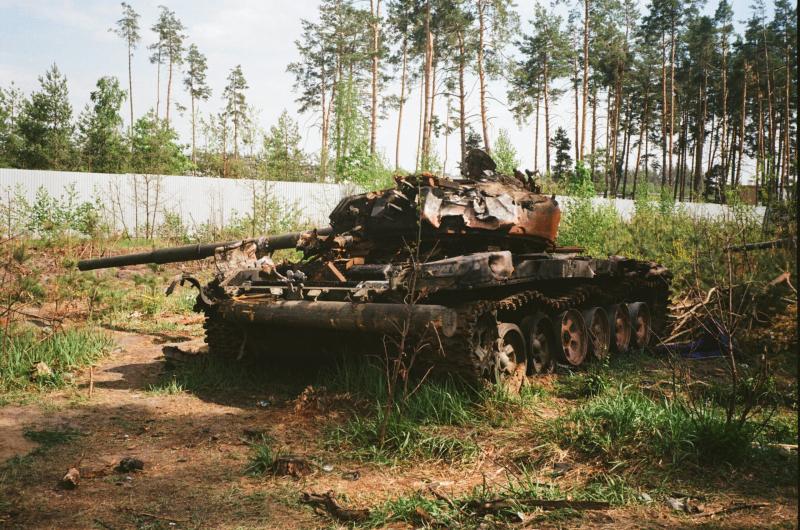The Ukraine war, environmental destruction and the question of ecocide
Early September, controversy erupted due to the US delivery of depleted uranium (DU) ammunition to Ukraine as part of their latest 175 million dollar military aid package, including the M1A1 Abrams tanks. Despite the US following the UK’s example, which had already sent DU ammunitions, this is the second controversial US arms delivery since the cluster bombs announcement.
Depleted uranium is a residual material of the radioactive U-235 that is denser than tungsten-tipped penetrators and thus more effective in piercing armour. Although depleted and not enriched uranium is used, DU bullets release traces of toxic waste and radiation, potentially exposing communities to long-term health risks.
Nevertheless, the UK Ministry of Defence and the US Department of Defense stress that the link between DU ammunition and health risks is inconclusive. In the meantime, Russian rhetoric has framed the delivery as an example of American inhumanity and a risk of nuclear escalation.
This framing omits the fact that Russia deploys both DU and cluster munitions and has been using the Zaporizhzhia power plant as a nuclear shield for over a year. The Russian incursion presents Ukraine with a dilemma as the Ukrainian army uses these weapons to defend their territory in the short- to medium-term but contributes to contaminating their soil in the long run.
Environmental degradation is often seen as a byproduct of war, but the deteriorating effects are frequently overlooked. So, while the investigation and prosecution of human rights violations are crucial responsibilities of the international community, similar efforts should be devoted to addressing responsibility for environmental harm.
The War in Ukraine has attracted significant political attention and could catalyse the campaign to make ecocide, i.e. “the mass damage and destruction of the natural living world”, an international crime. Hence, this briefing will first present a brief overview of some of the environmental damages in Ukraine, while the second part introduces the discussion on ecocide.

The environmental cost of war
President Zelensky has repeatedly called for Russia to be held accountable for the irrevocable environmental damages caused by its invasion. To demonstrate the extent of the environmental harm caused by Russia, the Ukrainian Ministry of Environmental Protection and Natural Resources identified and estimated that the current environmental costs of military actions amount to 2108 billion Ukrainian hryvnia.
Especially the breach of the Nova Kakhovka Dam has resulted in 150 tonnes of oil and other toxic substances entering the Dnipro. This threatens maritime life downstream as well as the countries around the Black Sea into which the Dnipro flows. The resulting deforestation and pollution of water sources threaten 35 percent of Europe’s biodiversity.
On the one hand, Russia causes environmental harm indirectly, for instance, by causing farmland degradation due to intensive shelling. On the other hand, Russia weaponizes nature directly as exemplified by the use of antipersonnel (AP) mines.

Despite AP mines being banned due to their indiscriminate and long-lasting effects as well as the threats they pose to agriculture and reconstruction, Russia has never signed the AP Mine Ban Convention.
Besides mines, EcoZagroza estimates that the soil is littered with 607114 tons of military waste from destroyed tanks, combat vehicles and intercepted missiles. Not only does this cause additional CO2 emissions, but the debris is often toxic and requires special disposal techniques to prevent it from seeping into the soil and groundwater.
Finally, the Russian forces exacerbated the historic pollution caused by heavy industry during the Soviet era. As per a report by the United Nations Environment Programme, the combination of historic and recent pollution will leave Ukraine and the surrounding region with a toxic legacy for years.
Nevertheless, Russia continues destroying critical infrastructure and civilian targets, causing human suffering and additional pollution. For instance, bombing residential buildings discharges asbestos, a substance only banned as recently as 2017. Similarly, the shelling of oil refineries and chemical plants releases hazardous fumes, contributing to the upsurge in air pollution.
Ecocide
The debate on ecocide or environmental destruction is not limited to the case of Ukraine, as several island states and environmental organisations have been pushing for decades to make ecocide an international crime. Some proponents propose to include ecocide in the Rome Statute of the International Criminal Court since the ICC already has jurisdiction to investigate and prosecute genocide, war of aggression, war crimes and crimes against humanity. However, implementing ecocide as a fifth crime in the Rome Statute is not straightforward.
One of the major hurdles in including ecocide in the international legal framework is finding consensus on its definition. Although there is an allusion to ecocide in Article 8(2)(b)(iv) of the Rome Statute, ecocide as such is not mentioned. To rectify this, the Independent Expert Panel convened by the Stop Ecocide Foundation proposed an amendment that defined ecocide as: “unlawful or wanton acts committed with the knowledge that there is a substantial likelihood that serious and either widespread or long-term damage to the environment will be caused by those acts”.
This definition would lower the burden of proof compared to Article 8(2)(b)(iv) of the Rome Statute, since it suffices to indicate that an environmental crime is either widespread or long-lasting.
However, even if the various State Parties agreed on a definition, they would require a two-thirds majority to amend the Rome Statute. Some legal experts even question whether the ICC is the best institution to prosecute ecocide as its complex procedures has been inconsistent in successfully prosecuting and convicting perpetrators in the past.

Furthermore, some major powers such as the United States, Russia, India and China have not ratified the Rome Statute. So, while the ICC has experience prosecuting perpetrators in armed conflict, including ecocide remains complicated.
Despite the challenges of including ecocide in international criminal law, the war in Ukraine has put the issue back on the political agenda. During the United for Justice conference, a special panel discussed ecocide legislation.
In addition, the European Parliament proposed to include ecocide in the revised Environmental Crimes Directive that could legally enshrine ecocide and would require transposition into national law.
Lastly, the United Nations adopted a legal framework to protect the environment during and after an armed conflict. These principles will apply in intrastate and interstate conflicts.
In conclusion, due to the political clout the Ukrainian conflict generates among major powers like the US, EU and China, it may contribute to the addition of ecocide to the list of international crimes.
Despite the potential difficulties in definition, concerning the issue of burden of proof and achieving criminal convictions, ecocide can serve as a deterrent for warring parties.
Clearly, this legal approach does not constitute a one-fits-all solution and additional measures should ensure environmental conservation and restoration during and after the conflict.
Brian Sabbe
Dit artikel verscheen in IPIS Arms Trade Bulletin: September – October 2023, IPIS, Antwerpen, 17 oktober 2023. Met dank voor de overname: https://ipisresearch.be/weekly-briefing/the-ukraine-war-environmental-destruction-and-the-question-of-ecocide/
Legal Definition of Ecocide: https://www.stopecocide.earth/legal-definition (met o.a. officiële vertaling in het Nederlands van de definitie)
Lees verder (inhoud oktober 2023)



